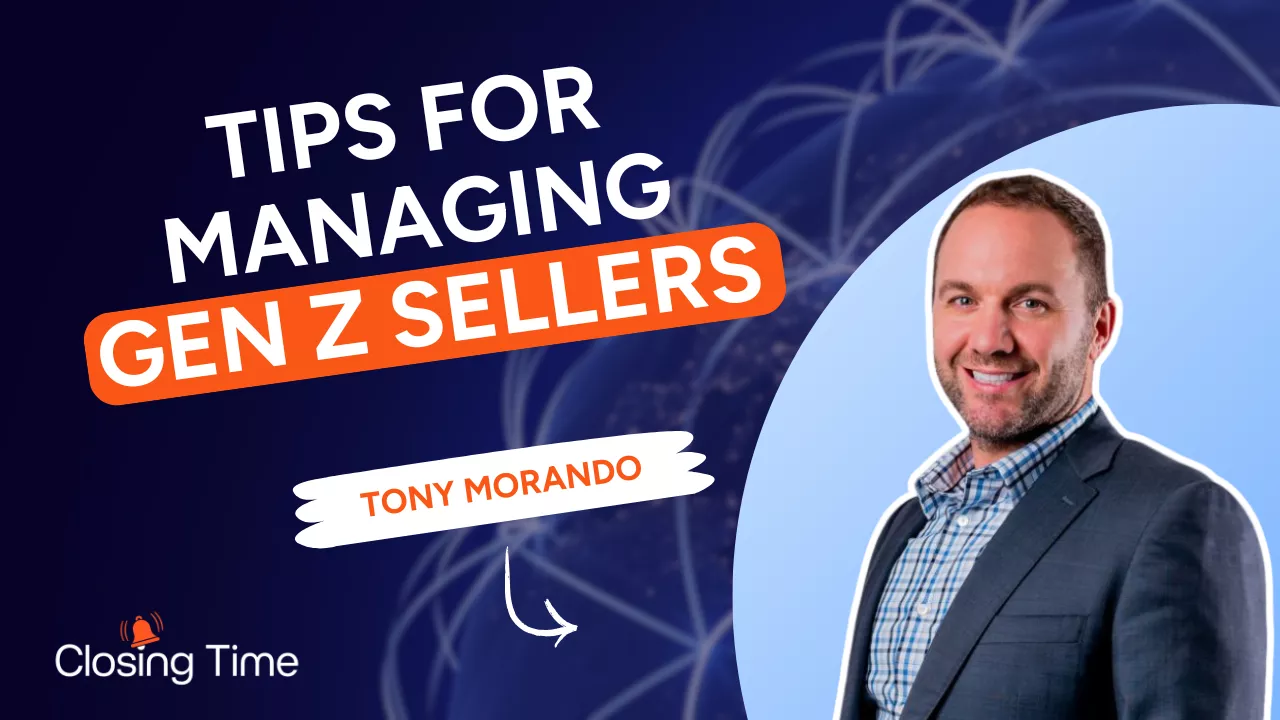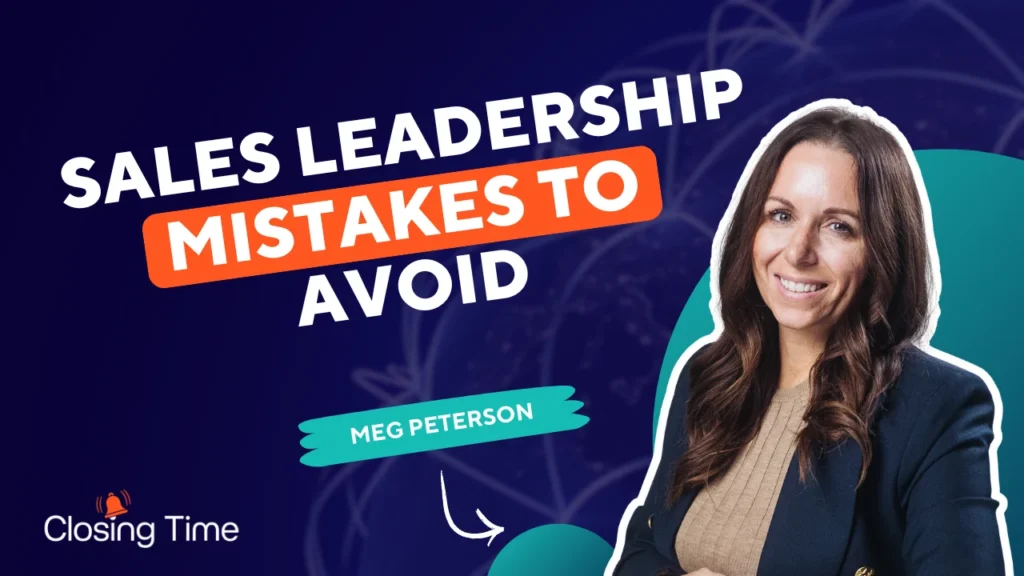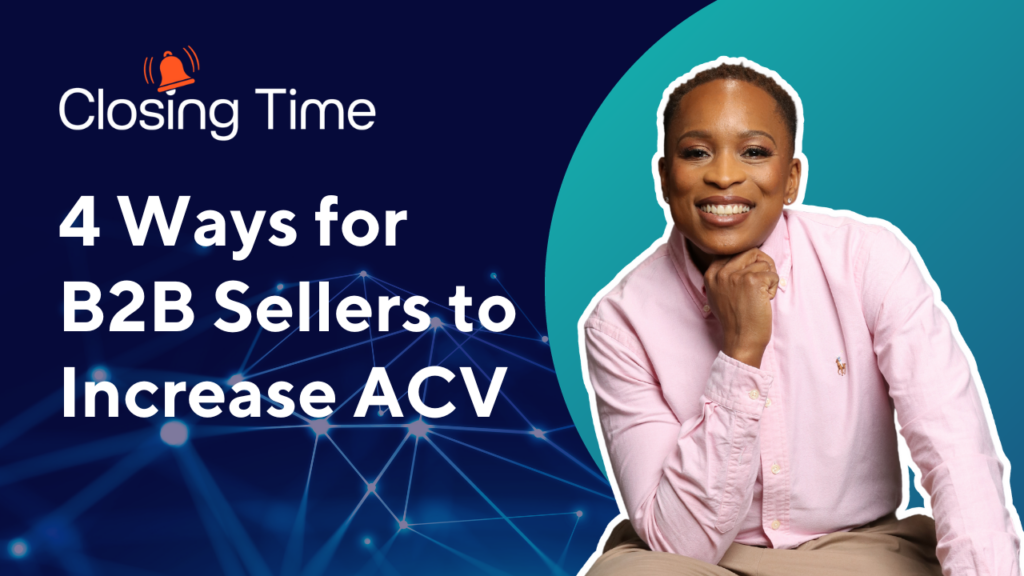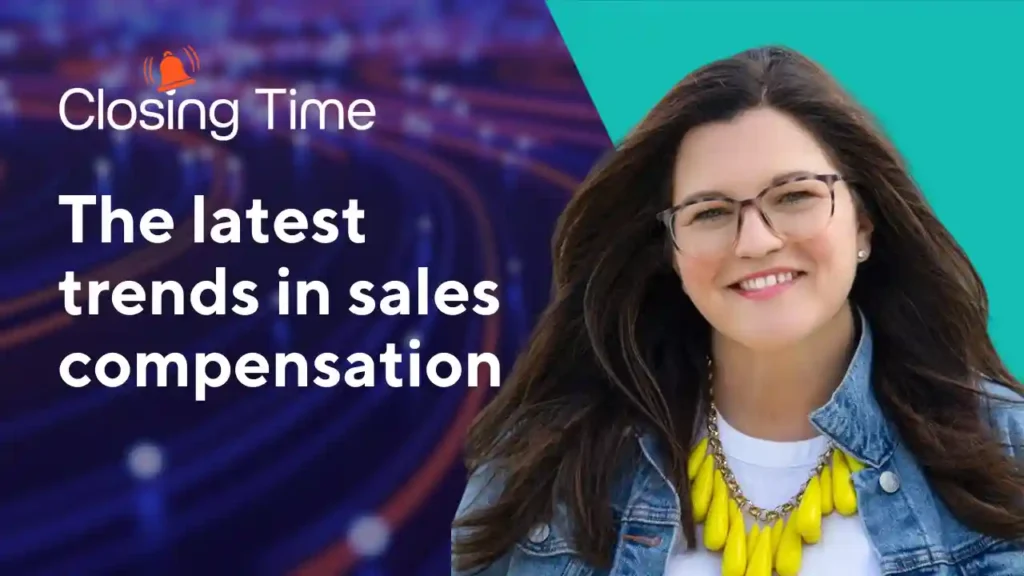Got a Gen Z’er on your sales team yet?
If not, trust me, it’s coming.
Let’s talk about managing a multigenerational sales team
on this episode of Closing Time.
Thanks for tuning in to Closing Time, the show for go to Market Leaders.
I’m Val Riley, head of marketing for Insightly, Unbounce, and Leads RX.
Today I am joined by Tony Morando.
He’s the strategic sales leader and chief sales
officer of World Emblem, a fast growing apparel business.
Tony, welcome to the show.. Thank you, Val, for having me.
you’ve built a career, Tony, in one place, rising
through the ranks of one company, which isn’t super common these days.
Can you tell me a little bit about your career progression?
Sure. Yeah.
So, right after college,. I started working for a uniform supplier.
I had a small market in Boston,. Massachusetts, where I was selling
uniforms to basically anybody you can imagine, whether it’s food
processing, manufacturing, safety security had a pretty good
two year career there, was promoted and moved out to San Diego, California.
So opposite end of the country.
During that promotion, I end
up taking a trip down to Florida, visit a friend,
and met the owners of World Emblem randomly at a at a dinner, hit
it off really well, and was offered a role that night working for the company.
20 years later, five promotions I now head up sales, for all of North America.
Mexico, US, Canada.
I oversee, customer service, service, outlet sales, inside
sales, as well as our most recent acquisition.
Wow. So five promotions.
Tell me what that was like.
It’s been wild.
Yeah, it’s been really, really wild.
I think, the key is to surround yourself with some really good mentors.
And fortunately for me,. I was taken under the wings of,
Jimmy Carr initially, who was, co-owner of World Emblem.
And he taught me a lot of, good ways of doing business,
bad ways of doing business.
And I just think over the years, just surrounding yourself with the right
people is really kind of led to at least my, my progression.
Yeah. That’s great to hear.
You know, so often we hear that, boy, you’ve got to jump around
if you really want to advance your career.
But you’re a testament to maybe that’s not always the case.
So I’m always delighted to hear that.
Thank you.
Just funny.
Yeah, we had a,
an internal meeting this morning, and we’re talking about this,
and, I’ve got a bunch of great tenures on the team.
So, some people have been here 30 years.
Some people 20 years.
And we were talking about it and asking, you know, the reason why,
people never left, and a lot of it came down to the culture, right?
The cultural fit for the individual into keeping them for such a long time.
Yeah.
That’s so true. Because,
you know, culture is the one thing you can’t buy and sell, right?
It has to evolve. It has to be organic.
So you guys have something special going there for sure.
Thank you.
Let’s talk a little bit about your current role, CSO.
Right.
Because so much of that role is really leadership and mentoring.
So describe the type of team that you manage.
You mentioned that there were some long tenured folks on there.
Imagine maybe a couple of newbies as well.
Yeah. So, currently. I have a team about 45.
And again, that spread out between Mexico, U.S.
and Canada, all different age groups.
I mean, we have
people right out of high school to people towards the end of their career.
And really, it’s unique not only from a age perspective,
but also from a cultural perspective where people are living.
So a lot of it is adapting.
What we’re seeing is depending on the role,
we are seeing that next gen come in. Right.
So we talk about the Gen Z years, which I know is the content of this call.
But, we’re starting to see that now as we expand, our team.
So we are hitting our next growth phase
where we’re going to be hiring about 12 additional reps.
And a lot of that is going to be Gen Z’ers.
Well, I’ll, I’ll hit you with this stat.
The US Bureau of Labor Statistics.
And I realize you’re in Canada and Mexico as well, but in the U.S.,
they say that, Gen. Z is going to make up 30%
of the US workforce by 2030.
And I know that number sounds far away, but that’s like five years.
So, it’s really right around the corner.
So talk to me a little bit about how you approach managing a Gen Z’er
versus maybe some of the more experienced members of your sales team.
We spent a lot of time really looking at roles
and responsibilities and being bringing clarity around their role.
Right.
So, what we found is they really want collaboration
amongst the different departments, constant feedback.
So I feel like Gen Z really thrives
in environments where they understand the why behind the work they’re doing.
they also see a clear path for growth.. Right.
It’s really important that they’re not stagnant.
You know,. I know they’re just starting to careers,
but they also want to see where they can go, you know, three years,
five years, ten years down the road.
And it’s really important, I think, to, to to visualize that for them
versus somebody that’s been here a long time
so they have a little more autonomy to make their own, decisions,
unless it’s something strategic that that it requires me to help them.
Yeah. So, let’s dig into that a little bit more.
So, you know, keeping folks challenged can be a challenge.
constantly providing that mentoring or feedback or growth.
Do you notice that with your Gen. Z employees, it’s it’s a little bit
more intense versus
someone who maybe is a little bit farther along in their career?
I don’t know if I would call intense.
I think the the intensity level
is probably the same, or what I do see is a lot more, questions really.
There’s a lot more inquisitive aspect of, of, you know,
how we’re doing things, what we’re doing, where we’re going, why we’re doing it.
More so than the people that have had a long tenure.
But, I really don’t see it kind of extreme one way or the other.
So one thing I’ve seen, Tony, which some of those Gen Z’ers is,
a little bit too much of an attachment to the phone, right?
Like, which, you know, the to their credit,
they’ve really grown up with. Yeah.
And I think, on that note, 100%, it’s something that, myself
and the managers were doing field trips with the Gen Z’ers is, you know, hey,
you can’t be on LinkedIn.
You can’t be on Instagram, you can’t be on Facebook when you’re with a client.
And it’s hard because the attachment to the phone is is,
you know, even as myself and older, like,. I have the phone checking emails,
but they’re checking their social medias and different platforms.
And the one thing that we really stressed is when we’re with customers, it’s
you got to be focused on the customer.
That’s it.
Like leave your phone in the car and it’s something that,
kind of a process that we’ve been testing is telling the customers
or the customers, our staff,
not to bring the phones in the appointments
for the reason that they can really focus on the customer.
They’re not checking the phones.
And even if they, you know, don’t think they’re doing it,
we still see them doing it’s just a bad habit.
Yeah. For sure.
You know?
And the truth is, they can probably multitask that.
But the perception is not great.
But, you know, the opposite side of that is when you bring Gen Z’ers
in, there’s no problem adapting any platform.
They really just are so tech native.
Yeah, we we’ve seen that as well too.
So I think,
particularly with us with our tech stack, whether that’s our CRM or our,
ERP or our website or our e-commerce platforms,
they tend to pick it up extremely fast, with a matter of minutes
where some of the older generations that come in,
you know, they’re not the most willing.
They don’t accept having to log in to the CRM.
It’s more of a pain for them, which, which has been really fun.
Yeah.
So just kind of sitting back and thinking about the 45 people on your team.
You know, you’ve probably, you know, got a couple of boomers,
couple of Gen X’ers, couple of millennials, Gen Z.
Just in thinking about how you approach those folks
differently and their motivations differently.
Tell me about how you sort of like context switch throughout the day.
Or is it is it more on a day to day basis,
or is it more like on during one on ones or even,
you know, zooming farther out when you’re doing, performance reviews?
Like, how do you engage with those generations differently?
What I’ve seen is that with the older generation,
they tend to adapt pretty well to some slight changes.
Right.
So what I’ve done with the Gen Z’ers is we have more frequent calls.
So we have what we call a daily huddle and just the daily check ins.
The team can go through some highlights from the previous day,
their one priority today.
So it really keeps them focused.
But it also gets them to allows them to get feedback from the rest of the team.
So everybody’s kind of integrating.
But we’re not adapting it for just the Gen Zers.
What we do is adapting it for the whole team.
And what we’ve seen is
the process tends to work well with the older generation, working
with the younger generation versus, you know, kind of changing it one by one.
I love that, actually, because it doesn’t put the burden so much on you.
It really does spread it out so that you’re giving these younger folks
who are just entering the workforce,
exposure to an older generation of workers through, like, a daily huddle.
So they get that mentorship,
not just from you, but really from their peers as well.
On the team.
And I think I think that’s the key, is the mentorship
that you hit the nail on the head there, that they really want the feedback
and they want somebody to help guide them.
But when they get it from one perspective,. I think it’s not as influential
as having a team of 15 different people, guiding them and coaching them
on all different perspectives.
They also seem to absorb it much faster than I’ve seen the old generation.
That’s good.
What’s one point for Gen Z? Right.
So you say, when you bring on a new team member, you’ve got like a 90 day coaching
and training, you know, onboarding plan that has some core pillars.
Has that philosophy had to be adjusted at all for Gen Z
or most of those philosophies staying the same?
And maybe there’s just some format differences.
Yeah, we haven’t really changed the format.
So things like accountability, customer obsession, performance metrics.
I don’t care
if it’s a Gen Z
or some
that’s just starting around high school or somebody
that, again, is at the end of their career.
We really want to maintain the same, accountability
throughout the entire business, the entire team.
Now, we did address some of the deliverables, in terms
of the content, how we’re sharing it with, the new generation.
Right.
So smaller pieces, more visual, more frequent check ins.
And what we’ve seen is that really kind of maintains engagement momentum.
We just actually, purchased a new software for us to roll out,
video training amongst the new hires coming on.
And I think that has been, so far, extremely successful, because they’re,
they’re able to watch and learn versus read a book or, read a manual.
Yeah.
Definitely a good switch.
We’ve been seeing that a lot.
So that the proliferation of video really making a difference.
So this is more of a general question, but in thinking about the Gen Z folks,
you know, there’s so much of a
of a tendency to you know, think poorly of a younger generation.
But on the opposite side of that, what are some qualities that Gen Z has
that might actually make them pretty suitable for a career in sales?
That’s a great question.
And I’ll use the example.
So our CEO, his son, just came aboard our team about,
I must say, four months ago.
And one thing that he brought
that I thought was really unique was his entrepreneurial attitude.
Right.
So in college, he had started his own business, and it was all digital media.
So he created his own Instagram page, his own following
and his ability to really kind of take that technology
and use it
to help drive an entrepreneurial spirit within our customers
has been really successful because it brings that consultative social
selling approach that, you know, maybe the older generation is lost a little bit.
I think that, the Gen. Z really has a way to sit, listen
and utilize that to kind of really drive consultative sales.
Oh, that’s a great perspective.
And we touched on this a little bit, but clearly the ability to pick up,
the tech stack of a company very quickly and run with it.
You know, there’s,
there is such a tech stack in sales, regardless of what industry you’re in.
So just having them be so native to just picking up different software systems
probably is, is a bonus in the column of Gen Z for a sales role as well.
It is, it is especially where we are very digital heavy.
So our platform for most of our selling, is through our e-com site.
And being able to constantly update that and have the Gen Z’ers
explain it to the end users in a very quick manner has been,
a big driver for some of our successes and our revenue growth.
So we think that’s only going to, kind of expedite our growth strategy
here over the next three years as we bring on, you know, other half dozen
to a dozen of Gen Z’ers, within the next six months.
Exciting. So let’s just.
I’ll hit you with one last question.
Let’s say you’ve got, a colleague who’s a sales leader
who’s about to bring on his or her first. Gen Z sales person.
What what what couple of, words of wisdom would you provide to that person?
Yeah, I think just be clear.
Be very clear with what you’re expecting for them.
No hidden agenda. Be very open.
You know, it’s something that I have with all of my staff is my phone is available
at any time for anyone to call.
Now, I’m not expecting calls at 7:00, 8:00 at night, but if if somebody came up
and they were in the chat, I’m always going to jump on a call with them.
And be able to provide constant feedback.
I think that’s really critical to maintain kind of their approach
and their influence in their, their drive to want to do well within the business.
So, I mean, I think that would be kind of the big points to, to call out.
Awesome. Tony.. Thank you for your time today.
Thanks for helping our listeners out there.
Get ready to welcome. Gen Z into the workforce.
Thank you for having me.
Tony, if people want to keep up with you, where could they stay connected?
Yeah.
You can find me on LinkedIn. It’s probably the best option.
So it’s, Tony Morando, on LinkedIn, there’s only one on me.
See if I’m here right away or if you go to our Worldemblem.com page.
You can find me there under contacts.
Awesome.
All right. Well, thanks so much for joining us.
And thanks to all of you for tuning in.
Feel free to sign up for the Closing Time newsletter to get this show delivered
right to your inbox.. We’ll see you next week.




